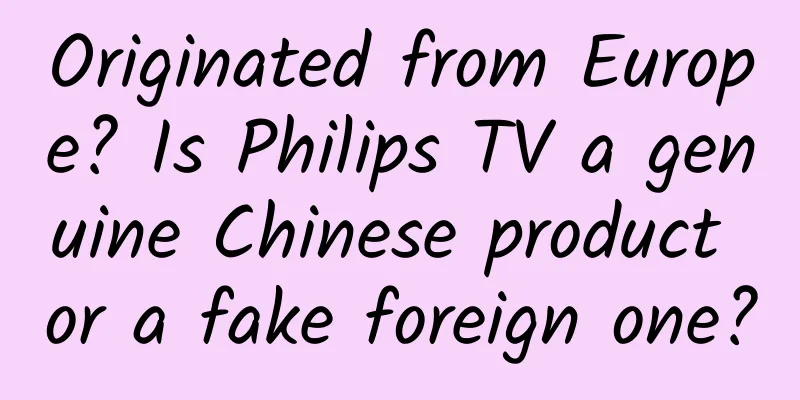Originated from Europe? Is Philips TV a genuine Chinese product or a fake foreign one?

|
When it comes to home appliances, many consumers are very concerned about quality issues when purchasing products. Whether shopping offline or online, consumers often compare products from different stores and read negative reviews on major e-commerce websites to decide whether to buy a product. This is how consumers judge product quality. Although negative reviews cannot completely determine the quality of a product or a brand, they do cause psychological resistance in consumers to a large extent. On January 11, at the 2016 China Smart Display and Innovative Application Industry Conference and CRC 2016 Color TV Research Conference, Philips' "Multi-channel Ambilight Technology" won the 2017 Innovation Technology Award, and 55PUF7071/T3 won the Color TV Innovation Product Award. Since CES2017, major home appliance manufacturers have won awards one after another, including Skyworth for OLED, TCL for quantum dots, Changhong for laser cinema, and Hisense for laser TV and ULED... In the face of the hype on the Internet, consumers' understanding of these brands is still in a state of hesitation. In fact, consumers don't care how many awards a company has won, but are more concerned about the quality and safety of the products they buy and the attitude of after-sales service. However, when faced with the complaints received and announced by the Consumer Association every year, the awards for home appliance companies seem embarrassing. New technologies have not brought any luster to the companies in terms of quality supervision and after-sales service. It is understood that in the third quarter of 2016, the National Consumer Associations accepted 89,916 commodity complaints, of which 29,720 were about household electronic appliances, accounting for 33.05% of the total commodity complaints and ranking first in commodity complaints. Due to the large number of household electronic appliances and their frequent use, the number of complaints has always been at the forefront. At the beginning of 2017, the Tianjin Consumer Association released an analysis of complaints in 2016, and complaints about household electronic appliances were still the hardest hit. The consumer base of household electronic appliances is large, and the proportion of complaints is high. The problems of this type of consumer complaints are mainly concentrated on the following: the manufacturer cannot provide accessories, resulting in extended maintenance periods and affecting normal use by consumers; some home appliances delivered to the door are of poor quality, and the service connection is disconnected when returning; problems with home appliances lead to property losses for consumers. In fact, it has become the norm for home appliances to be the hardest hit area for complaints. It is reported that currently in the domestic market, Philips TV is operated by TPV. In 2005, Philips' OEM factory was acquired by TPV. In 2008, Philips' global personal computer monitor business was fully taken over by TPV. In 2010, Philips found TPV again and expressed its willingness to sell Philips' TV business in China. Finally, in 2011, it authorized TPV to operate its TV business in China. Industry insiders believe that this shows that Philips has faded out of the TV business globally. Philips, the last "European noble", has entered the countdown for its TV business in China, and will soon be transformed into an authentic Chinese brand. It is understood that TPV Technology was originally a OEM company in Taiwan, China, and was later acquired by Great Wall. Compared with domestic and foreign color TV companies such as TCL, Skyworth, Konka, and Samsung, there is a big gap in quality management, product research and development, and core technology. Industry insiders said that Philips TV does not have its own production factory, and it is largely unable to monitor production and management quality, and the probability of product quality problems has increased. The editor learned from the Philips self-operated store on JD.com that some users expressed dissatisfaction with Philips TVs. Some of the complaints are selected below for consumers' reference. The JD Gold member said that this Philips TV often cannot connect to the Internet, and the maintenance personnel will only say "the network is not good" when they come to the door. The netizen said that there is light leakage in the upper left corner of the TV, and the customer service responded that "our machines are all like this, I suggest you buy another brand." The JD.com diamond member said that this was the worst experience he had in his eight years of using JD.com. On January 2, after the Philips TV arrived, he called the 400 official customer service to make an appointment for door-to-door installation. No one came until the 7th. The official after-sales and local customer service passed the buck to each other. Later, the netizen was given the phone number of an installer, who said, "This is not my responsibility." The netizen said, "I spent money and felt disgusted." "It's just garbage. The first time it was delivered, there were cracks. The second time it was delivered, there were cracks. And the second time, the after-sales service didn't care at all." Philips' explanation is: to prevent the product frame from squeezing the screen due to thermal expansion and contraction of the internal components, there are some gaps in the frame of the TV. So how do other brands solve the problem of thermal expansion and contraction? Do they all leave gaps in the frame? The user said, "The workmanship is too poor, and the gaps in the four corners of the TV are very large." "The workmanship is rough, the indicator label is warped, the seam at the bottom is rough and uneven, and the bottom screws are not aligned with the installation base. The workmanship is so rough that I don't know what the internal quality is like. I hope there are no problems." The Philips TV flagship store said: Philips and TPV Group are a strong combination. Philips is still the responsible party for brand management and quality management, and TPV is responsible for production, and Philips standards are still implemented. The user said that when the delivery worker was unpacking the package, he removed the end with nails, causing the nails to cut the screen. Netizens have expressed their willingness to "return the products decisively." The China Consumers Association has also reminded consumers that operators should ensure that the TV screens and other items are intact during delivery, installation, and debugging. Consumers should confirm whether the TV screens are intact when receiving the products, and refuse to sign for them if they find any damage. "The TV is averagely made and feels plasticky. It can't be plugged in with a 3.5mm audio cable or connected to existing speakers. The configuration is too low." The user expressed dissatisfaction with Philips' response that "the gap between the TVs is within the national regulations". In other brands' products, apart from defective products with unqualified workmanship, there are no gaps in the frame deliberately left due to "thermal expansion and contraction". “Before I bought the product, the customer service said that there were no bright spots on the screen. After it arrived, there were 5 bright spots on the screen. The customer service said directly that I was unlucky and bought a defective product.” The netizen said that there was not a single application found in the smart TV’s application store. “Philips customer service said that it could be installed before I bought it. After it arrived, they said that it could not be installed due to national policy. The smart installation application recommended a paid program.” He called it a scam company. "We called the installer but he didn't come to install it. He never contacted us. In the end, we had to ask the broadband installer to help us install it. The service was terrible." The following netizen said that after the TV arrived, he called for several days but no one installed it. The installer attributed the blurry TV image to the "large screen." This reason seems unconvincing. A large screen is not the reason for blurry TV images. The picture uploaded by the netizen shows that the words in the TV image are clear, but the image is blurry. "The delivery was fast, but the installation service was terrible. The installer was more powerful than the emperor. He kept putting it off. I didn't want to do it because it was far away, and I didn't want to do it because it was raining. I regret it now." "I used to hear people say Philips' after-sales service was rubbish, but I didn't believe it. This time, I learned my lesson. I had to call the installer several times to remind him. He just hung the TV on the wall and left, saying he was busy." The netizen said, "It is called a smart octa-core TV, but it takes half a day to play one frame. It should not be called a TV, but a portrait. I thought it was due to the broadband, but another TV played the same program smoothly..." He said, "Philips should be called Manlipu instead." "The installation engineer was terrible. He fooled me for three days. Fortunately, JD.com customer service helped me solve the problem. The installation engineer's attitude when he came to my house was so bad that he almost gave my elderly family a heart attack." At present, my country has not yet set clear standards for light leakage in household LED LCD TVs. The "General Specifications for Digital TV LCD Displays" implemented on January 1, 2007 clearly stipulates that the light leakage of LCD TVs must be ≤4cd/㎡ when the screen is completely black. Light leakage mainly occurs on LCD TVs or LCD displays. It means that when the LCD screen displays a black image, more light leaks out around the screen, making the screen look brighter than the center. Light leakage is an inherent defect brought about by the imaging principle of LCD TVs. Due to the existence of light leakage, the displayed black image is not black, resulting in reduced contrast, poor brightness uniformity, blurred image layering, reduced clarity, and poor image quality. It is understood that Philips TVs now claim on JD.com that they are "originating from Europe", "a century-old brand, a safe choice", and "Philips sales outlets cover 98% of the world". However, there were media reports that Philips TVs, which have now become authentic domestic products and manufactured by TPV, are no longer "originating from Europe". As a winner of Toutiao's Qingyun Plan and Baijiahao's Bai+ Plan, the 2019 Baidu Digital Author of the Year, the Baijiahao's Most Popular Author in the Technology Field, the 2019 Sogou Technology and Culture Author, and the 2021 Baijiahao Quarterly Influential Creator, he has won many awards, including the 2013 Sohu Best Industry Media Person, the 2015 China New Media Entrepreneurship Competition Beijing Third Place, the 2015 Guangmang Experience Award, the 2015 China New Media Entrepreneurship Competition Finals Third Place, and the 2018 Baidu Dynamic Annual Powerful Celebrity. |
>>: Tesla Model 3 deliveries begin this month
Recommend
For the first time in the world, how difficult is it to "dig soil" on the back of the moon?
On May 3, 2024, the Chang'e-6 probe boarded t...
Xingning SEO Training: Do you know the tools and methods for mining long-tail keywords?
If you have been optimizing keywords for a long t...
The mystery of the famous supernova explosion: Astronomers finally see the true face of the mysterious celestial body 170,000 light-years away
The evolution and fate of stars are closely relat...
He is determined to climb Mount Everest even without legs. He is the first torchbearer for the Paralympics!
March 2 Beijing 2022 Paralympic Winter Games Torc...
8 Tik Tok promotion skills to teach you how to play Tik Tok from scratch!
In the mobile era, traffic entrances were Weibo a...
Why do we have more “black spots” on our bodies as we age? Does it have any impact on our health?
A friend told Huazi that as he grew older, he fou...
ZenFone Zoom: Will ASUS, a tech-geek brand, be the next HTC?
When it comes to ASUS mobile phones, for some ent...
The elderly love to take naps, that may not be due to sleepiness
Daytime napping in older adults is normal in the ...
The entire process of listing on the App Store
App Store listing refers to the entire process of...
A preliminary study of Carthage: four advantages and four disadvantages
[[140844]] Carthage is a package management tool ...
National Cancer Prevention and Treatment Week丨1/3 of cancers can be prevented! Here’s what you need to know about cancer prevention…
April 15th to 21st of each year is the National C...
What is a 400 number? What are the numbers starting with 400 for?
The 400 telephone number is a 10-digit number. It...
Why are foldable phones popular but not commercially successful?
Two years ago, foldable phones were popular for a...
Driverless cars come up with new black technology: cars stop when pedestrians wave
Researchers have developed a driverless car syste...









